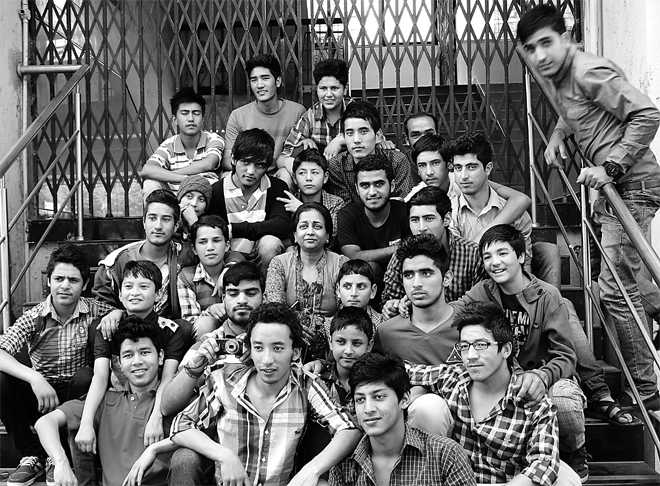
Students belonging to violence-affected areas of Kashmir learn to assimilate themselves into the country’s culture.
Vandana Shukla in Pune
The heightened Indo-Pak tension hardly offers a silver lining to anyone looking for a Kashmir that's beautiful and full of hope. Yet there are people who want to bring life back to where it belongs: Kashmir. Lives of about 4,000 children have undergone transformation in the past 16 years, thanks to Pune-based couple, Sushma and Sanjay Nahar.
The couple first took children affected by violence from Punjab during the days of militancy, and then Kashmir, on India Darshan tours, to widen their perspective about the country they abhorred. Soon they realized, more was needed to redraft their experience of India. This could happen only when their opportunities for education and employment are widened. They founded Sarhad, an NGO.
Joginder Singh was 4 in 1992, when militants surrounded his home in Doda (Jammu) and killed 16 of his family members. The carnage was in retaliation to the help offered by his father to the Army in identifying militants. Joginder, called Jaggi by friends, a happy-go-lucky young Sikh, is now doing final year of B. Com. The once withdrawn boy loves to dance.
Mukhtar Ahmad of Badgaon (Kashmir) would walk 6km to reach his school. Presence of an Army camp on the way meant often being caught in cross-border firing. Once, his cousin was shot in the leg. They had two options: to sit at home, or face bullets. It all changed when an acquaintance showed an ad in a local newspaper. It invited applications from children living in border areas to pursue education in Pune. About 200 children, aged between 5 to 12 years, came to Pune, in 2004, of these 35 were girls.
Tsewang Namgyal's father was martyred in the Kargil war. All the children of martyred soldiers study in Army School, Leh. They are brought to Pune, with the help of the Army, after they clear 6th standard. Tsewang and Jaggi bond equally well with Amir (name changed), the son of a Kashmiri militant, killed by the Army.
They all live under the same roof, share rooms and their lives. It takes a while before they realize they are victims of the same circumstances. They learn to forgive their own past, as well of others.
Softening the blow
Erasing hatred is not easy. "Even my family gets influenced by people in Kashmir, they say, Indians will convert you. I know my people here, I assure them. Our teachers taught us how to wash clothes, it wasn't their job. They taught us for such meager salaries. Most of us are pursuing professional degrees now. I want to go back to Kashmir to change people's wrong perceptions about India," says Mukhtar, training to be a physiotherapist.
"The only time we have a tiff is, a cricket match between India and Pakistan, rest of the time, we think alike. I don't like it in Kashmir now, people have a narrow worldview there. Our aai (mother, they mean Sushma), treats us like her own kids, gives us Idi, we wear her sarees on school functions; we have Ganpati, Quran and Buddha, sitting together, they never fight. That's our home," says a chirpy Nasrin, 17, who came to Pune, when she was 4.
Kindness received is reciprocated by Kashmiri youth. When Bodo orphans came to Sarhad from Kokrajhar (Assam) after ethnic strife of 2014, they were unable to communicate. Senior Kashmiri students took responsibility of one child each and made a beginning by communicating in sign language. The Sarhad family speaks in different tongues now and can switch effortlessly between Marathi, Kashmiri, Ladakhi, Bodo, Hindi and English. Seniors wash clothes of their juniors, take care of their meals and studies. They don't need nor have wardens in their hostels.
Hope sustains life
Bullets shot in Kashmir create ripples in Pune. It's not an easy road, observes Sanjay Nahar. "It was not simple persuading people to entrust their children's lives with us, among widespread distrust. Initially, we took these children to the reputed institutions in the city. Due to their influx, the schools started rejecting admission applications. It was then that we decided to establish our own school and later a college. The funds are raised from the fees received by local students, who our strength," says Nahar, founder Sarhad.



























